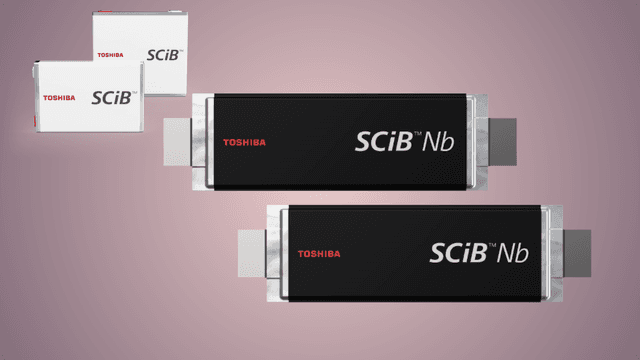
Toshiba Corporation along with two other companies unveiled a prototype electric bus that’s powered by next-generation SCiB batteries. The new energy storage device with extreme longevity can be charged 80% in just 10 minutes.
Suitable for fully electric, hybrid, light and heavy vehicles, the battery can reduce capital expenditures and operational expenses.
It also minimizes risk of fires and explosion and improves operating rate. The battery also gives more power for faster acceleration.
Market debut expected by 2025
SCiB Nb cells by Toshiba can operate in a range of temperatures. The older version of the battery had a weak energy density of up to over 200 Wh/l .
However, the next generation of SCiB batteries has 50% more energy density at 350 Wh/l. The battery supports next generation urban electric mobility.
Toshiba’s cells have been previously tested in various EV cars but these new cells can be useful for electric buses or heavy vehicles as these can easily operate at temperatures from -22 to 140°F to (from -30 to +60℃).
Ultra-fast charging capability
The ultra-fast charging capability of these cells is also an additional advantage of these batteries.
New SCiB Nb battery can debut in the market by 2025, according to Toshiba.
On June 20, Toshiba, Sojitz and CBMM unveiled the ultra-fast charging prototype electric bus powered by next-generation lithium-ion batteries with NTO Anodes at CBMM’s industrial plant in Araxá, Brazil.
This marks the world’s first operation of a prototype e-vehicle powered by a lithium-ion battery with niobium titanium oxide (NTO) in the anode, further paving the way to battery commercialization.
NTO has twice the theoretical volume density of the graphite-based anode
The three companies will continue to work together to maximize the use of their respective technologies and knowledge, toward launching the next-generation lithium-ion battery with NTO anode in the global market in Spring 2025.
“I am very pleased to see an E-bus equipped with our NTO battery, SCiB Nb,” said Toshihiko Takaoka, vice president of the Battery Division at Toshiba Corporation.
“In partnership with CBMM and Sojitz, Toshiba has implemented the practical use of niobium in battery material applications with the development of an NTO battery that recharges quickly and delivers high energy density. We will continue the development work to expand our SCiB™ battery lineup and business”.
NTO has twice the theoretical volume density of the graphite-based anode generally used in lithium-ion batteries, which prompted the three companies to sign a joint agreement to explore its potential in June 2018.
They subsequently signed a joint development agreement in September 2021 that extended their collaboration to mass production processes of next-generation batteries, mainly targeting application in commercial e-vehicles.























